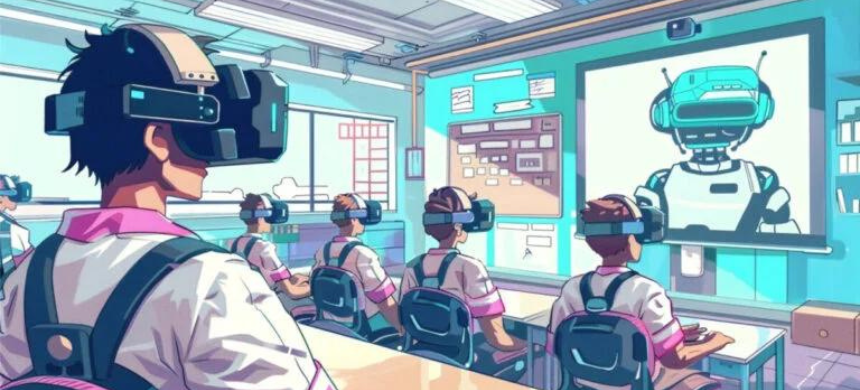Gone are the days when teachers simply lectured at the front of the classroom. A new era is emerging as 20 GCSE students embark on a groundbreaking learning journey where artificial intelligence (AI) takes center stage.
Using advanced AI platforms and virtual reality headsets, these students will experience a level of personalized education never seen before. The AI-driven system will tailor lessons to each student’s strengths and weaknesses, offering a customized learning experience that adapts to their individual needs. For example, if a student struggles with math but excels in science, the AI can adjust the curriculum to provide extra support in math while allowing for faster progress in science.
Teacherless Classes: How It Works
While the concept of a classroom without a human teacher might seem futuristic, David Game College has ensured that students will still receive necessary guidance. Three “learning coaches” will be present to monitor behavior, offer support, and teach subjects where AI currently struggles, such as art and sex education. These learning coaches act more as facilitators, ensuring that the AI system runs smoothly and that students remain engaged and motivated. Their role is crucial in bridging the gap between technology and human interaction, providing a balanced educational experience.
Read More: IBA Announces Scholarships for Students Hailing from Gilgit-Baltistan
AI’s Role in Education
The introduction of AI-led classrooms has sparked a heated debate about the future of education. Critics argue that an over-reliance on AI could dehumanize learning, stripping away the interpersonal skills developed through interaction with human teachers. They worry that students may become overly dependent on technology, losing critical and creative thinking skills.
Conversely, supporters believe that AI has the potential to revolutionize education. They argue that AI’s ability to provide personalized learning is unmatched, offering precision and efficiency that human teachers cannot achieve. For instance, AI can analyze vast amounts of data to identify patterns in a student’s learning, allowing for targeted interventions that help them overcome challenges more quickly.
Could AI Replace Teachers?
The concept of AI-led classrooms raises an important question: Could AI eventually replace human teachers altogether? While this might seem a distant possibility, the rapid advancements in AI technology suggest it could become a reality sooner than expected. However, many experts believe that AI will never fully replace teachers but will work alongside them to enhance the learning experience. AI can handle grading, data analysis, and lesson planning, allowing teachers to focus on building relationships with students, fostering creativity, and encouraging critical thinking.
The Benefits of AI in Education
The benefits of AI in education are numerous, including:
- Personalized Learning: AI tailors lessons to each student’s individual needs, allowing them to learn at their own pace.
- Efficiency: AI can manage administrative tasks, enabling teachers to spend more time on teaching rather than paperwork.
- Data-Driven Insights: AI can analyze student performance data to pinpoint areas needing extra support.
- Accessibility: AI can provide resources and tools to assist students with learning disabilities.
Challenges and Concerns
Despite the benefits, there are challenges and concerns regarding AI-led classrooms:
- Lack of Human Interaction: Critics argue that AI cannot replace the human touch teachers bring to the classroom.
- Data Privacy: The vast amounts of data collected by AI systems raise concerns about how this data is stored and used.
- Equity: There’s a risk that AI-led education could widen the gap between students with access to advanced technology and those without.
The Future of Education
As David Game College prepares to launch its AI-led classroom, the education world will be watching closely. While there are valid concerns about AI’s impact on education, the potential benefits are also exciting. The key to success will be finding a balanced approach that leverages the strengths of both AI and human teachers. By working together, AI and educators can create a learning environment that is more personalized, efficient, and effective than ever before.











